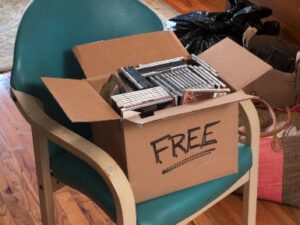The phrase “vacant home” conjures up an image of a creepy, rundown home that may or may not be haunted. In reality, most vacant homes are simply residences that are currently empty of occupants (including ghosts). Whether you are on an extended trip, leaving a vacation home vacant, or selling a home you’ve moved out of, there are definitely some scary surprises that can crop up if you aren’t careful about how you leave your property.
Beware the Vacant House
We’ve collected a list of the most dire situations we see downsizers run into when leaving their home vacant, as well as some pro tips on how to keep your empty home free of problems.
- Maintenance Issues. Without proper maintenance, a vacant home can quickly turn into the stuff of midnight specials as cobwebs begin to collect in the eaves, hinges grow creaky, and weeds cover the overgrown yard. An unsightly appearance may leave your neighbors and your HOA disgruntled. And if you’re trying to sell your home, an unsightly appearance is a big turn-off to potential buyers.
- Disasters. Problems that would be easily discovered while occupying a home can often slip through the cracks, and are often not caught until it’s too late to prevent bigger disasters. Plumbing and electrical problems can arise with no one in the home, and storm damage can easily go undetected.
- Missed Payments There are still plenty of bills that need to be paid for a vacant house, and falling behind can pose threats to your financial reputation. Forgetting to pay the utilities may result in stopped services, frozen pipes, late fees, and even a tanked credit score. Delinquent property taxes can lead to a tax lien on your home.
- HOA Fines. If your neighborhood has a Homeowners Association, problems can arise if you neglect to stay current on upkeep and dues. You may have a lien placed on your home by your HOA, extensive fines for any broken rules, and you may even be banned from using common areas until the issues are fixed.
- Lapse in Insurance Coverage. Your homeowners insurance may not cover a vacant home. Many policies include a clause regarding long-term vacancies, and issues ranging from theft to water damage may not be covered while your home remains unoccupied.
- Crime. Vacant homes run a greater risk of being vandalized or burgled.
- Unwelcome Guests. Rounding off our list is every homeowner’s worst nightmare: squatters. Whether they’re the animal variety or human, you don’t want uninvited guests showing up and making themselves at home.
Though these potential problems can be frightening, with the proper preparation, you can rest easy knowing your home is cared for in your absence. Our top tips for preserving a vacant home include:
- Contact Your Insurance Company. Talk to your insurance company about your policy and what is required to keep your coverage active while you’re away. You may need to purchase a separate policy for a vacant home if your current policy does not allow for long term absences.
- Consider Smart Home Devices. Smart security systems and programmed lights can help to make it look like somebody is home, helping to deter possible intruders. Many will alert you instantly if there is a breach, and often have bonus features like moisture or fire detection for added peace of mind.
- Turn Off Water. Consider turning off the water to the house to prevent frozen or burst pipes and other water-related catastrophes. If you need to keep it on, make sure to shut off the valve to your washer to avoid burst hoses, and inspect the home regularly to ensure there are no leaks.
- Up Your Privacy. A good pair of blinds goes a long way. Not only do they protect your furnishings from sun damage, Ne’er-Do-Wells are less likely to break in and destroy your property if they can’t tell what’s going on inside.
- Hire Out Maintenance. If you aren’t around to do it yourself, consider hiring a house-sitter to bring in mail and do a walk through the home weekly, a lawn care company to handle upkeep on the yard, or even a property maintenance company that can do all of that for you.
- Program Your Thermostat. Keeping your thermostat set to 55 degrees or more helps to prevent frozen pipes. It will also help to regulate moisture in the home, and if you’re trying to sell the house, potential buyers will be happy to get out of the weather when viewing.
- Add Nice Touches. To make your vacant home seem less empty, add some nice touches for potential buyers. Cute entry mats make a good impression and also minimize tracked-in dirt. If your own furniture is no longer in the home, consider having it staged so it looks more lived-in, and gives buyers hints at where their own furniture can go.






